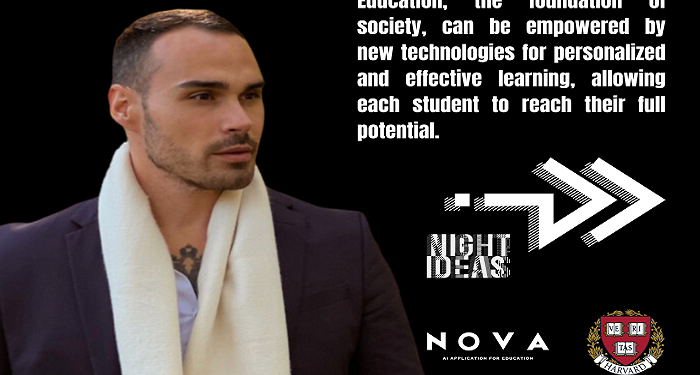Article written by : Raphael Ciccarelli
We were fortunate to be present at the thought-provoking event held at Harvard University during the Night of Ideas, where Jean Arnaud, a highly esteemed educator and edupreneur, captivated the audience. This event, organized by the French Consulate of Boston and Villa Albertine, gathered distinguished attendees, including Nobel Prize laureates Abhijit Banerjee and Esther Duflo. Arnaud’s talk centered around the revolutionary impact of new technologies like AI and the metaverse on education. His unyielding belief in the transformative power of education, coupled with his philosophical perspective and embrace of cutting-edge technologies, has propelled him to the forefront of educational innovation. Together with his Nova co-founders, Arnaud is leading a revolution in education with a strong focus on personalized learning, seamless AI integration, and the boundless potential of the metaverse.
During his riveting talk, Arnaud emphasized that education is not just a sector; it serves as the very foundation upon which our society is built. He passionately argues that education imparts significance to all other fields of human endeavor and plays a crucial role in shaping the spirit we cultivate as individuals and as a collective. Drawing inspiration from luminaries like Montaigne, Arnaud’s deep-rooted philosophical background informs his unique approach to education, stimulating profound reflection on the ideals we uphold and the pivotal decisions we make.
Arnaud astutely recognizes the necessity for individuals to possess a multifaceted skill set that surpasses mere technical abilities in what he aptly terms the “neo-renaissance” era. He championed a vision of the polyvalent human—an individual enlightened by reason, imagination, will, and action. According to Arnaud, being solely an engineer or a practitioner is no longer sufficient in today’s dynamic world. Instead, he advocates for a comprehensive approach that integrates critical thinking, creativity, and a long-term philosophical vision. Arnaud firmly believes that technology, when aligned with a clear societal goal, can serve as a powerful amplifier of human potential, broadening the horizons of our understanding. Through digitalization and immersive technologies, we have an extraordinary opportunity to shape the future. However, it is crucial to have a well-defined destination in mind as we navigate this transformative landscape.
Arnaud envisions immersive technologies, such as virtual reality and augmented reality, as tools for enriching our understanding of reality and enabling us to explore the realm of the impossible. Contrary to popular belief, he sees these technologies as allies rather than enemies, heightening our abilities instead of replacing them. Arnaud’s organization, Nova, fully embraces the potential of the metaverse to create immersive, interactive, and personalized learning experiences. In Nova’s virtual learning environments, students can embark on journeys to ancient cities, manipulate atoms, collaborate with peers and teachers, interact with their surroundings, and engage in hands-on learning through virtual experiences. The metaverse goes beyond being a mere educational tool; it actively promotes learning by doing and project-based pedagogy, enhancing knowledge retention. Moreover, it fosters inclusivity, as avatars allow individuals to express themselves freely, free from judgment based on origin or appearance.
But that’s not all.
According to Arnaud, AI will play a pivotal role in shaping the future of education. Through personalized learning, AI-powered tools can customize education to suit the individual needs of students, providing targeted strategies and aiding in the tracking of their progress. Arnaud envisions AI as a valuable asset for enhancing writing skills, offering feedback, and generating ideas for further exploration. Moreover, AI can automate administrative tasks, identify students who may be at risk, and improve grading and assessment processes. At Nova, AI serves as a personal assistant, not to replace humans, but to amplify the learning experience. For example, a virtual study assistant can engage students in Socratic dialogue, fostering critical thinking. When AI integrates with the metaverse, remarkable possibilities emerge, such as engaging in conversations with historical figures like Julius Caesar or Einstein.
Arnaud’s vision extends beyond technological advancements. He advocates for an inclusive and equitable education system, where avatars serve as catalysts for personal development, breaking down barriers and fostering collaboration among students. By embracing AI and the metaverse, Nova aims to create a learning environment that empowers students to realize their full potential, offering personalized support and deepening their understanding of the world.
Yes, Jean Arnaud, an acclaimed educator and edupreneur, is revolutionizing education through the integration of AI, philosophy, and the metaverse. His visionary approach encompasses personalized learning, immersive technologies, and the cultivation of the polyvalent human. By harmonizing these elements, Arnaud and his organization, Nova, are paving the way for a future where education unlocks the untapped potential of every student and nurtures a responsible and enlightened society.
Learn more:
https://www.linkedin.com/in/jean-arnaud-14887b1b4/




